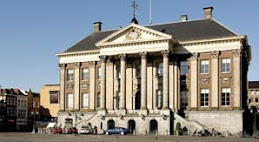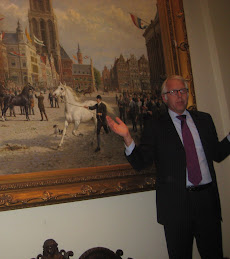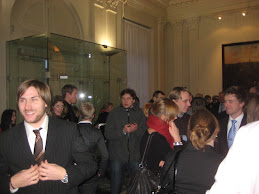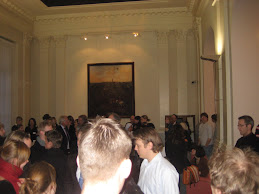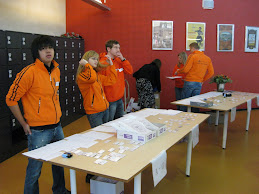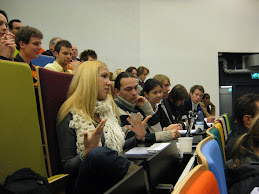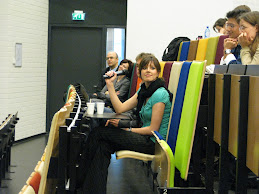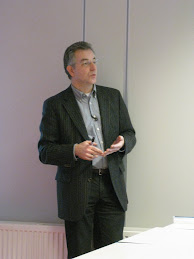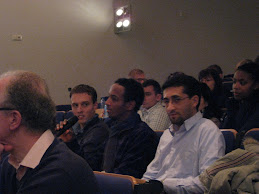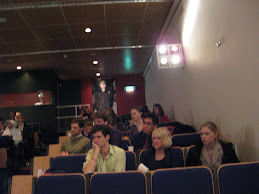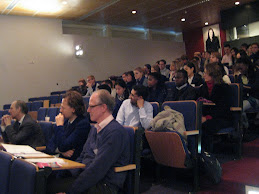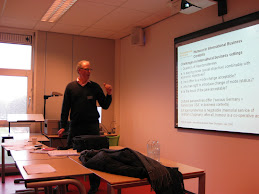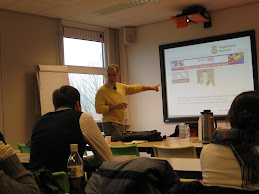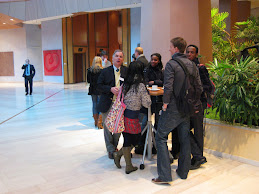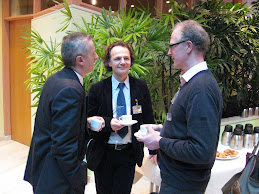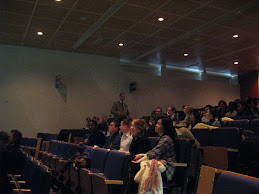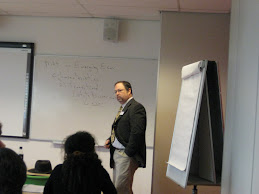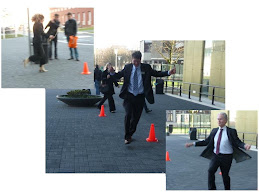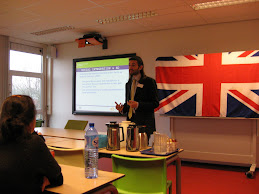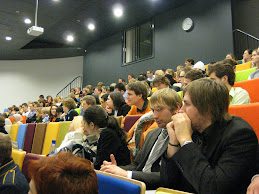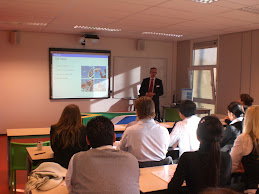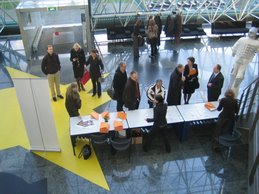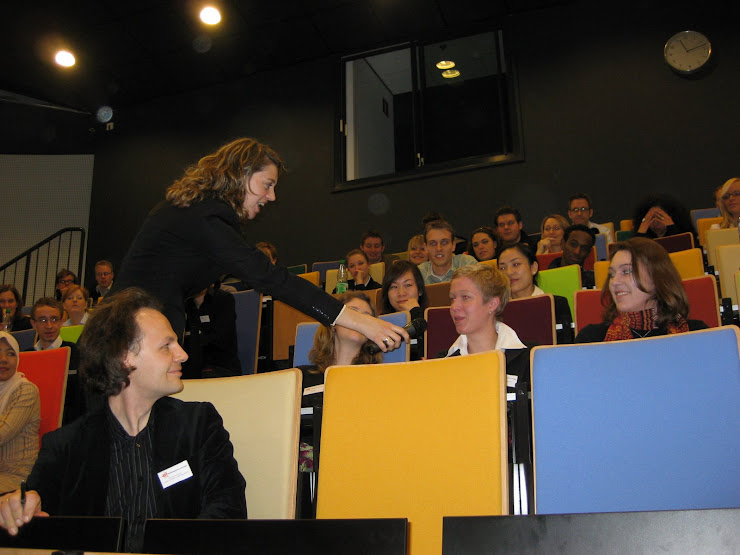Message from Bram ten Kate (Team Manager IBS)
With the first International Business Week a great tradition was born! Staff and students mentioned frequently during the IBW that this should be continued in the coming years. We had great guest speakers from our company contacts, alumni and partner universities. I would like to thank all speakers during the week for their great contibutions! Also, thank you students for your active participation!
Before long I will evaluate the week with a few 4th year students. Should we make this week compulsory for all 4th year students? Can we and should we expand it to a Hanze wide week? How can we get the 2nd year students involved as well? Should we work with a more specific theme for next year or is it better to keep it open to all contributions from our network?
Thank you speakers, students and guests for your inspiring and active contributions! You made the 1st IBW a great succes!
Wednesday, February 4, 2009
Sunday, February 1, 2009
FIRST INTERNATIONAL BUSINESS WEEK
Thursday, January 29th, 2009
Message by Kathy Ruiz
As every participant in the International Business Week, I was expecting with anxiety the speech of the mayor of Groningen – Mr. Jacques Wallace. The topic of his speech was ‘Groningen – city of talent’ and at first I was afraid that it sounded too cliché, but actually I was disproved when the presentation started and the mayor told us interesting stories from his rich experience and visits at the so called ‘sister’ cities.
It was quite interesting to learn that some of the sister cities of Groningen include Newcastle (UK), Graz (Austria), Tallinn (Estonia), San Carlos (Nicaragua), Murmansk (Russia), Oldenburg (Germany), Tianjin (China) and others. During the speech the mayor explained how Groningen was established and how it has evolved through the years. Ever since medieval times it has been an attractive area due to its crucial location – in a crossroad between a sea and a river and actually the only ‘path’ through the swampy province of Drenthe. That is how Groningen became an attractive port with routes to Scandinavia, the Baltic republics, and even Russia. Talking about Russia, as mentioned above, Murmansk is one of Groningen’s partner cities, and at first the relationship between those cities was based on exchanging technical know-how, mostly west towards east, but later Murmansk happened to be one of the Russia’s biggest energy ports. After this point, the relationship between these cities moved to another level – energy affairs.
Another interesting story of the speech was the relationship between Groningen and Bremen. At one of the mayors’ meetings of those cities, Bremen stated its position that the city is more interested in looking east towards Hamburg and Berlin and not to the West. Later on, the newly elected mayor of Bremen saw the potential of the northern part of the Netherlands and called a meeting where he clearly stated his interest in an active relationship with Groningen. Adding up the already existing relationship with Oldenburg, Groningen is more oriented to Germany more than towards the Netherlands.
To further show the importance of the sister cities, Graz, Austria adjusted their transport network replacing the busses and switching to a rail transport, particularly trams. Groningen followed the idea and there is an ongoing project for introducing a tram network in the city.
In short, Groningen has truly international outlook with developed exchange and trade of agricultural goods, services, know-how and actively developing position in the fair trade. The areas to improve in terms of internationalization and sister cities are to limit the numbers of the sister cities, to close the non-active relations, and to establish connections with a Muslim city.
-------------------------------------------------------------------------------------------------
Message from Joost van Slobbe
Franz Josef Gellert gave the second presentation on Thursday, on of the senior lecturers from IBS. Since 2001 he specializes in teaching marketing, economic and management. He is currently working on finishing his PHD, for which he researches the interaction between employers and employees, their mutual needs, wishes, demands and requirements. His presentation had a set-up, which existed out of two parts; Nomad workers and ageing workforce. During the presentation Mr. Gellert kept walking through the room in order to include as many people as possible to make the presentation lively. His talk was scheduled
It was clear that his research showed that Nomad workers are becoming more and more important nowadays. Nomad workers are people doing their work partly from home or locations other than the office, but they also must be able and willing to travel and be willing to work abroad. The labour market has been, and is changing faster and faster, due to this, the trend is to hire nomad workers. In order to become a nomad worker, having an extensive network is a must; therefore you off course need great communication skills!
In order to properly manage nomad workers, on needs to think out of the box to give people certain special circumstances to do their work. Make it possible for them to do their work in their own time and be curious about opportunities.
It can be concluded that nomad workers are: Highly skilled people, Flexible workers, employees of the future and definitely be more present in organizations.
For the second part of his presentation Mr. Gellert talked about the ageing workforces. This was just a very small part of the presentation and basically only covered the results of his research, which he had done at Volvo, Daimler and 6 residential homes. These researches where done by interviews or questionnaires and took between 1 and 4 years.
It is said that by 2040 one third of the work population in Europe is older than 60 years. Mr Gellert wants to find out whether the ageing workforce has a positive or negative effect on the companies’ turnover and efficiency. He showed that his research proved that the average age was very important at Volvo and Daimler but also at the Residential homes. Overall it was proved (for these three sectors) that a higher age had a positive effect on performance.
At the end of his presentation there was a Q&A session, which lasted for much more time than was initially scheduled. This proved that his research raises a lot of interesting questions, which Mr. Gellert was able to explain perfectly by the way.
-------------------------------------------------------------------------------------------------
Message by Joost van Slobbe
The last workshop of the IBS international business week I attended was one given by Mr. Paagman from Océ Nederland. Mr. Paagman was called in on very short notice since one of the other speakers was not able to attend the second workshop session of the day.
He started with a very short Q&A session during which he asked a lot of question to the students: if they knew Océ, if they knew what they wanted to do after graduation etc.. Then Mr Paagman plugged in a DVD with a promotional movie of Océ, after that we found at that Océ is a very big player on the printing and document handling market, he assured us that also the Hanze uses their machines. Documents are still used by all companies, and therefore there are plenty of business opportunities for them!
After his introduction he came to the overall direction of his presentation, which was to help us find out what we wanted to do after graduating. He did this by giving us a test also used by his company by applicants, made by Edgar H. Schein. This test was aimed to find out what our Career Anchors where. Career anchors refer to differences in what people look for during their career, and are based on the self-image of people. This image contains 3 of components: 1. Perceived talents and competences of one self (based on successes in work situations). 2. Perceived motives and needs (based on self evaluation, testing and feedback by others) 3. Perceived attitudes and values (based on a confrontation between personal and work/organizational values)
The test contained 40 statements, which we then had to rate 1-6, 1 being when the statement never applies to you and 6 being: the statementalways applies to you. The results had to be filled in at the end of the test, which gave the result of the anchor (Technical-functional competence, management competence, autonomy and independence, security/stability, entrepreneurship and creativity, service or dedication to the good cause, pure challenge, and lifestyle integration).After this there was a group assignment, in groups of 2 we needed to find out what the other student’ anchors where by looking at their past experience.
The result of the both tests gave me a very helpful insight in my own career anchors. Mr. Paagman provided his insights and showed why he (and Océ) where so enthusiastic about this method.
Thanks to the good, friendly and open way of presenting from Mr. Paagman, but also because of the interesting questionnaire, this presentation (from my point of view) was one of the best of this first IBS international business week.
-------------------------------------------------------------------------------------------------
Message from Kerstin Schulte
The first lecture I attended this afternoon was about marketing in emerging economies. The lecturer, John C. Sullivan is American who is currently a lecturer at one of the partner schools of the IBS in Tallinn, Estonia.
Topics in this lecture covered the identification and definition of emerging economies, characteristics of the market structure for entry into these markets, consumer buying behaviour and other marketing issues relevant to these special markets.
Emerging markets represent almost one-fifth of the world’s economies and have over four billion people living in them. They are characterised by a high growth rate and an increasing population. The main difficulty for marketers who enter these markets is often the uncertain infrastructure they are faced with, which affects the ability to enter these markets.
Mr Sullivan started by presenting the key characteristics of the so-called BRIMC economies (Brasil, Russia, India, Mexico and China). These countries are regional powerhouses, meaning they cause other economies to pull up and marketer can expand easily in these countries. These economies are transitional, which signifies that they often turn from state focussed to real market driven economies. While China has a more open attitude to foreign investment, India is still controlled by the state which makes it difficult for foreign marketers to enter. Furthermore, the fast growth of these economies results in fast change, which is a challenge to marketers due to the shorter time frame of developed plans and strategies. Important when entering new economies is to remember that they gain more and more political and economic power (also due to their resources). A marketer should consider this and play partner and focus on a good relationship.
A major characteristic of emerging economies is the high difference between poor and rich. Around 5-20% of the population are the so-called “elites” who have money, while the majority of the population consists of people who are concerned about the price and who tend to stick to local brands. When targeting the latter audience, it is important to choose the right medium, as they often do not have television for example and media such as billboards might be a more effective tool. The most effective way to reach these people is often a well expanded distribution channel. Often a product is marketed well, but this becomes useless if a product is not available. Mr Sullivan mentioned the example of Coca Cola who has maybe the best distribution channel and is therefore very successful in entering emerging economies.
In my opinion, the most important issue pointed out in this lecture is that understanding the consumers in developing markets opens up more opportunities for businesses which is especially important in these times of economic downturns. It was obvious that Mr Sullivan knew what he was talking about and he presented it in a funny and interesting way, which ended up in an exciting discussion.
Message by Kathy Ruiz
As every participant in the International Business Week, I was expecting with anxiety the speech of the mayor of Groningen – Mr. Jacques Wallace. The topic of his speech was ‘Groningen – city of talent’ and at first I was afraid that it sounded too cliché, but actually I was disproved when the presentation started and the mayor told us interesting stories from his rich experience and visits at the so called ‘sister’ cities.
It was quite interesting to learn that some of the sister cities of Groningen include Newcastle (UK), Graz (Austria), Tallinn (Estonia), San Carlos (Nicaragua), Murmansk (Russia), Oldenburg (Germany), Tianjin (China) and others. During the speech the mayor explained how Groningen was established and how it has evolved through the years. Ever since medieval times it has been an attractive area due to its crucial location – in a crossroad between a sea and a river and actually the only ‘path’ through the swampy province of Drenthe. That is how Groningen became an attractive port with routes to Scandinavia, the Baltic republics, and even Russia. Talking about Russia, as mentioned above, Murmansk is one of Groningen’s partner cities, and at first the relationship between those cities was based on exchanging technical know-how, mostly west towards east, but later Murmansk happened to be one of the Russia’s biggest energy ports. After this point, the relationship between these cities moved to another level – energy affairs.
Another interesting story of the speech was the relationship between Groningen and Bremen. At one of the mayors’ meetings of those cities, Bremen stated its position that the city is more interested in looking east towards Hamburg and Berlin and not to the West. Later on, the newly elected mayor of Bremen saw the potential of the northern part of the Netherlands and called a meeting where he clearly stated his interest in an active relationship with Groningen. Adding up the already existing relationship with Oldenburg, Groningen is more oriented to Germany more than towards the Netherlands.
To further show the importance of the sister cities, Graz, Austria adjusted their transport network replacing the busses and switching to a rail transport, particularly trams. Groningen followed the idea and there is an ongoing project for introducing a tram network in the city.
In short, Groningen has truly international outlook with developed exchange and trade of agricultural goods, services, know-how and actively developing position in the fair trade. The areas to improve in terms of internationalization and sister cities are to limit the numbers of the sister cities, to close the non-active relations, and to establish connections with a Muslim city.
-------------------------------------------------------------------------------------------------
Message from Joost van Slobbe
Franz Josef Gellert gave the second presentation on Thursday, on of the senior lecturers from IBS. Since 2001 he specializes in teaching marketing, economic and management. He is currently working on finishing his PHD, for which he researches the interaction between employers and employees, their mutual needs, wishes, demands and requirements. His presentation had a set-up, which existed out of two parts; Nomad workers and ageing workforce. During the presentation Mr. Gellert kept walking through the room in order to include as many people as possible to make the presentation lively. His talk was scheduled
It was clear that his research showed that Nomad workers are becoming more and more important nowadays. Nomad workers are people doing their work partly from home or locations other than the office, but they also must be able and willing to travel and be willing to work abroad. The labour market has been, and is changing faster and faster, due to this, the trend is to hire nomad workers. In order to become a nomad worker, having an extensive network is a must; therefore you off course need great communication skills!
In order to properly manage nomad workers, on needs to think out of the box to give people certain special circumstances to do their work. Make it possible for them to do their work in their own time and be curious about opportunities.
It can be concluded that nomad workers are: Highly skilled people, Flexible workers, employees of the future and definitely be more present in organizations.
For the second part of his presentation Mr. Gellert talked about the ageing workforces. This was just a very small part of the presentation and basically only covered the results of his research, which he had done at Volvo, Daimler and 6 residential homes. These researches where done by interviews or questionnaires and took between 1 and 4 years.
It is said that by 2040 one third of the work population in Europe is older than 60 years. Mr Gellert wants to find out whether the ageing workforce has a positive or negative effect on the companies’ turnover and efficiency. He showed that his research proved that the average age was very important at Volvo and Daimler but also at the Residential homes. Overall it was proved (for these three sectors) that a higher age had a positive effect on performance.
At the end of his presentation there was a Q&A session, which lasted for much more time than was initially scheduled. This proved that his research raises a lot of interesting questions, which Mr. Gellert was able to explain perfectly by the way.
-------------------------------------------------------------------------------------------------
Message by Joost van Slobbe
The last workshop of the IBS international business week I attended was one given by Mr. Paagman from Océ Nederland. Mr. Paagman was called in on very short notice since one of the other speakers was not able to attend the second workshop session of the day.
He started with a very short Q&A session during which he asked a lot of question to the students: if they knew Océ, if they knew what they wanted to do after graduation etc.. Then Mr Paagman plugged in a DVD with a promotional movie of Océ, after that we found at that Océ is a very big player on the printing and document handling market, he assured us that also the Hanze uses their machines. Documents are still used by all companies, and therefore there are plenty of business opportunities for them!
After his introduction he came to the overall direction of his presentation, which was to help us find out what we wanted to do after graduating. He did this by giving us a test also used by his company by applicants, made by Edgar H. Schein. This test was aimed to find out what our Career Anchors where. Career anchors refer to differences in what people look for during their career, and are based on the self-image of people. This image contains 3 of components: 1. Perceived talents and competences of one self (based on successes in work situations). 2. Perceived motives and needs (based on self evaluation, testing and feedback by others) 3. Perceived attitudes and values (based on a confrontation between personal and work/organizational values)
The test contained 40 statements, which we then had to rate 1-6, 1 being when the statement never applies to you and 6 being: the statementalways applies to you. The results had to be filled in at the end of the test, which gave the result of the anchor (Technical-functional competence, management competence, autonomy and independence, security/stability, entrepreneurship and creativity, service or dedication to the good cause, pure challenge, and lifestyle integration).After this there was a group assignment, in groups of 2 we needed to find out what the other student’ anchors where by looking at their past experience.
The result of the both tests gave me a very helpful insight in my own career anchors. Mr. Paagman provided his insights and showed why he (and Océ) where so enthusiastic about this method.
Thanks to the good, friendly and open way of presenting from Mr. Paagman, but also because of the interesting questionnaire, this presentation (from my point of view) was one of the best of this first IBS international business week.
-------------------------------------------------------------------------------------------------
Message from Kerstin Schulte
The first lecture I attended this afternoon was about marketing in emerging economies. The lecturer, John C. Sullivan is American who is currently a lecturer at one of the partner schools of the IBS in Tallinn, Estonia.
Topics in this lecture covered the identification and definition of emerging economies, characteristics of the market structure for entry into these markets, consumer buying behaviour and other marketing issues relevant to these special markets.
Emerging markets represent almost one-fifth of the world’s economies and have over four billion people living in them. They are characterised by a high growth rate and an increasing population. The main difficulty for marketers who enter these markets is often the uncertain infrastructure they are faced with, which affects the ability to enter these markets.
Mr Sullivan started by presenting the key characteristics of the so-called BRIMC economies (Brasil, Russia, India, Mexico and China). These countries are regional powerhouses, meaning they cause other economies to pull up and marketer can expand easily in these countries. These economies are transitional, which signifies that they often turn from state focussed to real market driven economies. While China has a more open attitude to foreign investment, India is still controlled by the state which makes it difficult for foreign marketers to enter. Furthermore, the fast growth of these economies results in fast change, which is a challenge to marketers due to the shorter time frame of developed plans and strategies. Important when entering new economies is to remember that they gain more and more political and economic power (also due to their resources). A marketer should consider this and play partner and focus on a good relationship.
A major characteristic of emerging economies is the high difference between poor and rich. Around 5-20% of the population are the so-called “elites” who have money, while the majority of the population consists of people who are concerned about the price and who tend to stick to local brands. When targeting the latter audience, it is important to choose the right medium, as they often do not have television for example and media such as billboards might be a more effective tool. The most effective way to reach these people is often a well expanded distribution channel. Often a product is marketed well, but this becomes useless if a product is not available. Mr Sullivan mentioned the example of Coca Cola who has maybe the best distribution channel and is therefore very successful in entering emerging economies.
In my opinion, the most important issue pointed out in this lecture is that understanding the consumers in developing markets opens up more opportunities for businesses which is especially important in these times of economic downturns. It was obvious that Mr Sullivan knew what he was talking about and he presented it in a funny and interesting way, which ended up in an exciting discussion.
Subscribe to:
Posts (Atom)
